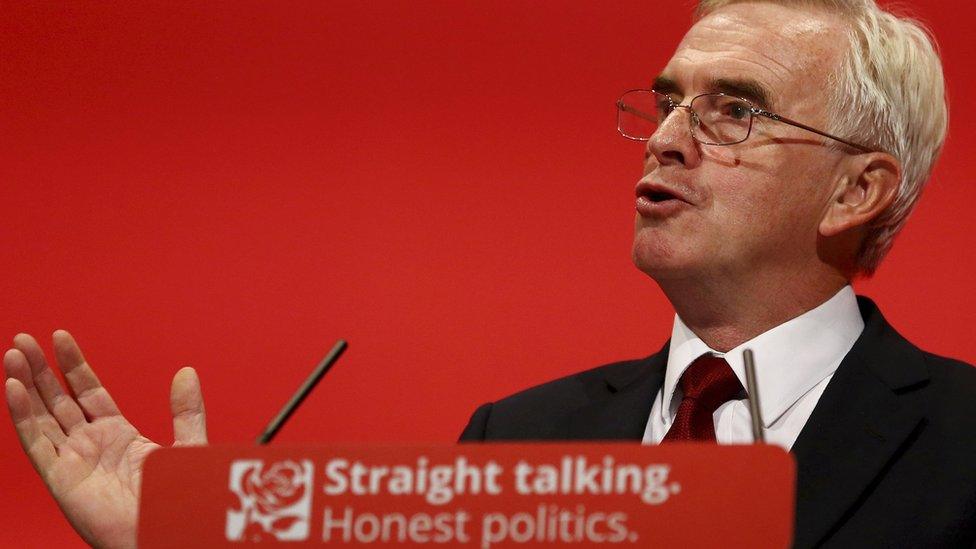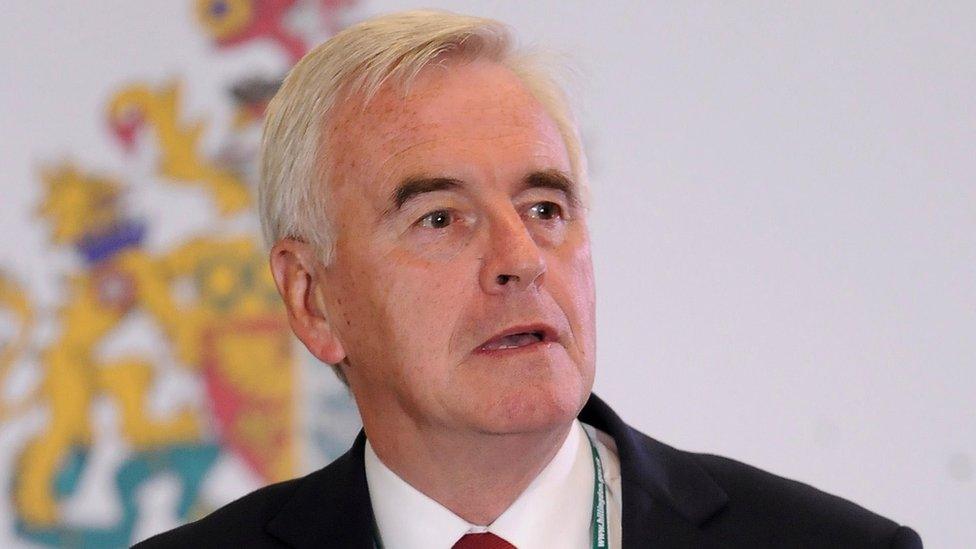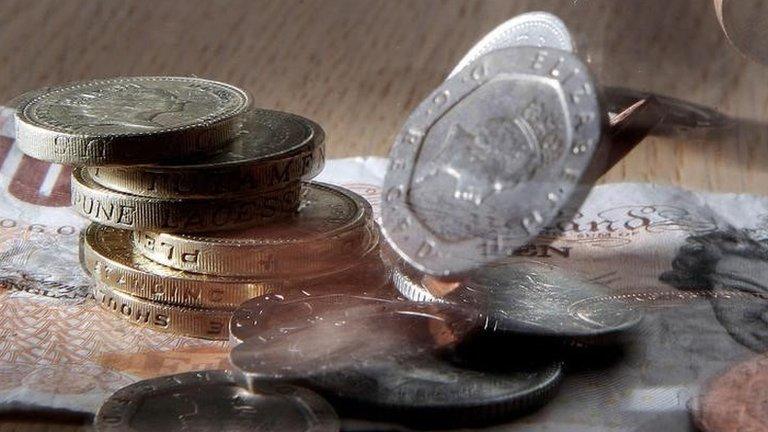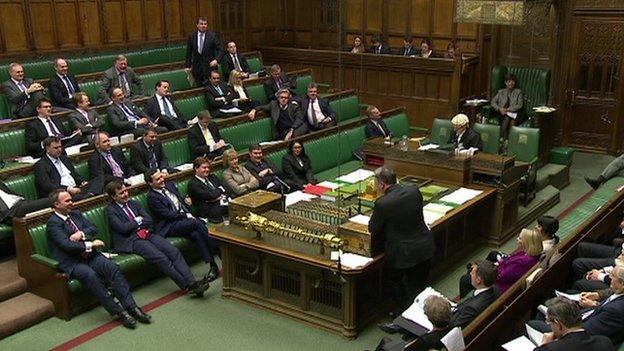Labour fiscal charter U-turn sparks backlash
- Published
- comments

Shadow chancellor John McDonnell has sparked a backlash from some Labour MPs after ditching the party's support for the government's fiscal charter.
Mr McDonnell said Labour would oppose the bid to force future governments to run a budget surplus, having recently said, external the party would vote in favour.
The situation was branded a "shambles" after MPs were told about the U-turn at a stormy meeting at Westminster.
But an ally of leader Jeremy Corbyn predicted angry MPs would "calm down".
Mr McDonnell, who had to explain the move at what was described as a more "reflective" shadow cabinet meeting on Tuesday morning, said the U-turn would "underline our position as an anti-austerity party".
The BBC's Eleanor Garnier said some at the meeting of the Parliamentary Labour Party had reacted in fury at the decision - one which BBC political editor Laura Kuenssberg says, external Mr Corbyn had "no idea" was coming.
Former shadow chancellor Chris Leslie criticised the U-turn and said Labour should set out its own motion.
"To go from one extreme to the other is wrong in economic terms but also it sends the wrong message to the general public as well," Mr Leslie told BBC Radio 4's Today programme.
"I think to be fair to John McDonnell this is a very difficult balancing act, it's a very difficult topic, but it's incredibly important that he is clear and consistent and explains fully not just what Labour's position is but also why he backed George Osborne's surplus a couple of weeks ago and is now against it apparently."

Analysis by BBC political correspondent Iain Watson
The vast majority of Labour MPs didn't want Jeremy Corbyn as their leader - and they anticipated that divisions would be inevitable on everything from nuclear weapons to Syria. But what rattled them at last night's meeting of the Parliamentary Labour Party wasn't the politics of the leadership, but a perceived lack of competence.
They assumed at the very least that the straight-talking of the leadership election would have become embedded. Instead they had a lack of clarity from a leader who largely remained silent while some of his supporters were verbally savaged by sceptical MPs - as his shadow chancellor reversed his position of just a fortnight ago not to oppose George Osborne's fiscal charter. They were also dismayed at the lack of consultation about a potentially significant change of direction.
So they are now nervous about what else might go wrong and whether the approach of near-peaceful co-existence is sustainable. Yet the U-turn, however badly effected, wasn't without logic. If Labour gets an even worse result in next year's Scottish elections - and polls suggest it might - than in 2011, pressure will mount on the Corbyn leadership. The SNP will vote against the fiscal charter this week and would have been delighted to see Labour pay lip service to it. Nicola Sturgeon could then portray her party as the only major political force that opposed austerity.
So while still insisting he isn't a "deficit denier" John McDonnell had to protect his party's left flank. But the manner and speed of his manoeuvre has left many of his own MPs dazed and confused.

But one of leader Jeremy Corbyn's allies, shadow international development secretary Diane Abbott, said some in the party were "only slowly coming to terms with the fact that Jeremy won" the leadership contest.
She said the row over Mr McDonnell's change of heart was "a process story" and said most of the Parliamentary Labour Party were comfortable with the position being taken.
Diane Abbott MP says the Labour party is "in the right position now" on the vote
"I suspect my colleagues, on reflection, will calm down," she added.
MPs will debate and vote on Chancellor George Osborne's Charter for Budget Responsibility on Wednesday.
The charter seeks to commit future governments to spend less than they receive in tax revenue when the economy is growing.
The proposal commits the government to keep debt falling as a share of GDP each year and achieve a budget surplus by 2019-20. Governments will then be required to ensure there is a surplus in "normal times".

Austerity battle
George Osborne became chancellor in 2010, pledging to tackle the UK's deficit and debt (here Norman Smith explains the difference).
The coalition government made major spending cuts - known as "austerity" - from 2010-15.
Further cuts were announced after the Conservatives won May's election.
Labour's Jeremy Corbyn opposes austerity, saying the Conservatives have imposed a "terrible burden" on Britain's poorest people.

Labour's turnaround comes two weeks after Mr McDonnell pledged support for Mr Osborne's plans, saying Labour were not "deficit deniers", at the Labour Party conference.
He also described the charter as a "trap for us to fall into".
John McDonnell, speaking on 28 September: "We will vote for it on the basis that we want to assure people that we will tackle the deficit, we will balance the budget, we will live within our means"
Explaining his change in position, Mr McDonnell said there was a "growing reaction" to the "nature and scale" of public spending cuts, which had prompted the change of position.
"We will underline our position as an anti-austerity party by voting against the charter on Wednesday," he said.
"Labour will set out our plan for tackling the deficit, not through punishing the most vulnerable and decimating our public services but by ending the unfair tax cuts to the wealthy, tackling tax evasion and investing for growth."
Mr Osborne said Labour's economic policy had "lurched from chaos to incredibility".
"Two weeks ago they said they were going to vote for a surplus - now we know they want to keep on borrowing forever. That would be a grave threat to the economic security of working people," he said.

The mood at Monday's meeting
By BBC political correspondent Eleanor Garnier
It was a long and difficult meeting of the Parliamentary Labour Party. One MP said it was the worst they had ever been to. Jeremy Corbyn was apparently "read the riot act" and said nothing. Another described it as lacking "any aspect of democratic politics".
A former shadow cabinet member told me that it was "without doubt one of the most heated" PLPs and "passions were running high". Others were clearly outraged at the shadow chancellor's change of plan. As he left the meeting, former cabinet minister Ben Bradshaw branded it a "total shambles".
John Mann MP was furious; he shouted so loudly at the party's leadership that he was easily audible in the corridor outside. Despite that anger, a spokesman for Mr Corbyn said the meeting had been "warm and friendly" claiming the only disagreement had been on the need for there to be more discussion on the issue. It all shows the seriousness of the cracks within the party and many in Labour will worry about how much worse it could all get.

At the weekend, SNP leader and Scottish First Minister Nicola Sturgeon challenged Labour to join her party in voting against the charter.
Welcoming the U-turn, Angus Robertson, SNP leader at Westminster, said it was "promising" but added it was "disgraceful there has had to be any doubt that the Labour Party would oppose Tory cuts".
He said the vote would be a major test for Jeremy Corbyn's leadership, claiming Labour's credibility "would be in ruins" unless every one of its MPs voted against the charter.
The independent Office for Budget Responsibility would be responsible for policing the new rules.
It would also have the power to decide when the government should be able to spend more than it is taking in revenue - for example, when the country is in a recession.
- Published26 September 2015

- Published10 June 2015

- Published13 January 2015
